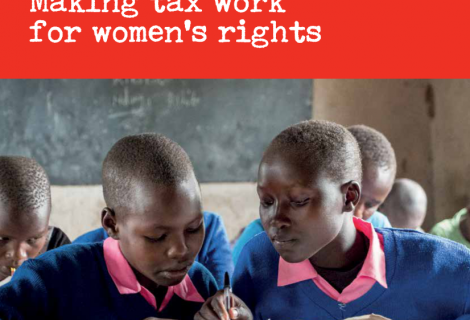
The fulfilment of women's rights is closely linked to how tax is raised and spent. While there is great potential for tax to bring about positive changes in women's lives, the way that tax policies tend to be enacted at present doesn't maximise this potential: instead, for example, in many developing countries, governments choose to offer tax breaks to corporations, while the services that women need are struggling for funding.
Women are disadvantaged in comparison to men, according to virtually every global measure: women do the vast majority of unpaid care work, are overrepresented in poorly-paid and precarious work, and one in three women will experience violence in their lifetimes. Governments have the responsibility to ensure that women can access and realise their rights, and one key step to ending gender inequality is to provide more and better-quality public services. This will reduce women’s unpaid care burden: for example, providing piped water to households eliminates the need for women to make long and often hazardous journeys to water-points.
To fund these essential public services, governments need to raise more tax, and to do so through progressive taxation policies, meaning that those with higher incomes pay a higher proportion in tax than those living on very little. However, the most progressive forms of taxation – those based on personal income and wealth – are underused, often in favour of flat-rate taxes, such as consumption tax, that create an increased burden on the poor. Corporate tax revenues in developing countries are much lower than they could be because of governments offering tax breaks in return for investment, despite the lack of robust evidence that tax breaks encourage investment. Our research has found that numerous developing countries give away more than 0.5 per cent of their Gross Domestic Product (GDP) in corporate tax breaks, while spending less than 0.03 per cent of GDP on ministries that focus on women’s rights and empowerment.
To raise more tax revenues for public services that benefit women, and to do so in ways that promote women’s rights rather than undermining them, all governments need to:
- Maximise available public resources to invest in gender-responsive public services that will help to end gender inequality and fulfil women’s rights.
- Establish gender-responsive budgeting to ensure tax revenue is spent in a way that promotes gender equality gives all women a say in how public money is spent.
- Raise taxes in the most progressive way possible, with more emphasis on direct taxation of income and wealth.
- Ensure that companies are paying their fair share of tax, including by curbing tax incentives.
- Carry out tax impact assessments to identify the direct and indirect effects of taxes by gender, paying particular attention to the impacts of both taxes and public spending on the poorest women.